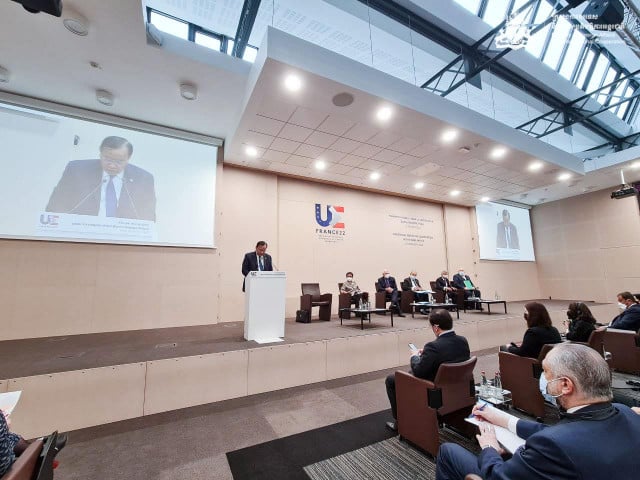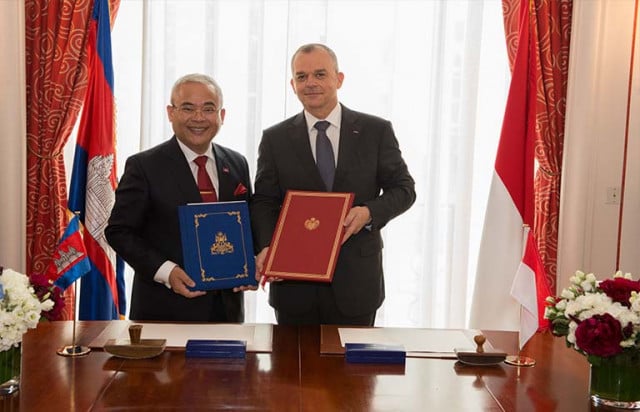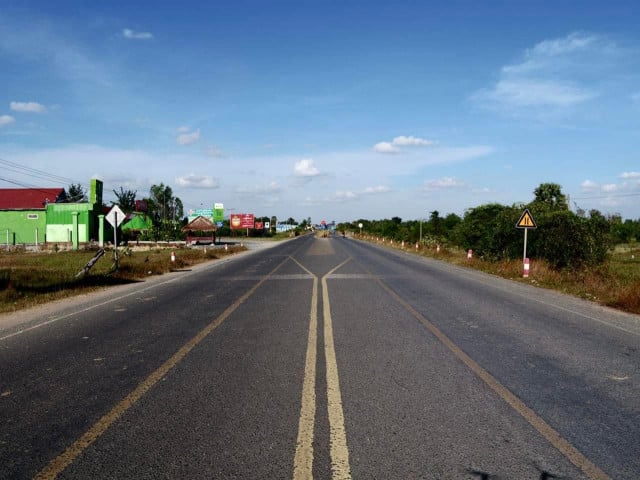Cambodia Requests European Help in Building ASEAN’s Autonomy

- By Sao Phal Niseiy
- February 23, 2022 2:25 PM
Representing the Chair of ASEAN, Prak Sokhonn requested European countries support ASEAN develop the bloc’s strategic autonomy to pursue cooperative policies free from power politics
PHNON PENH--Cambodia, as the current chair of the Association of Southeast Asian Nations (ASEAN), called on its European partners to provide support to the bloc in fortifying regional autonomy amid great power rivalry.
Speaking on behalf of the ASEAN chair on Feb. 22 at the Ministerial Forum for Cooperation in the Indo-Pacific Forum in France, Cambodian Foreign Minister Prak Sokhonn said that Southeast Asian countries want support so that they can build strategic autonomy, adding that European partners can fulfil this need.
“The EU and European partners, including France, need to present an alternative option to help Southeast Asian countries expand their strategic autonomy,” Sokhonn said.
Sokhonn requested that European countries support ASEAN to pursue its own goals independently in the areas of economic cooperation, connectivity, trade, climate change as well as sustainable development.
The Foreign Minister continued that the European countries should focus on what he called practical areas of cooperation, based on the principles of mutual respect, mutual understanding, mutual trust as well as mutual interest.
Sokhonn raising the issue of strategic autonomy at the forum demonstrates the critical role of the EU not only for the development of the region, but also in stabilizing the region, according to Po Sovinda, a PhD scholar at Griffith University in Australia.
Despite the fact that some European powers such as the UK and France, which previously colonized many Southeast Asian countries, Sovinda said, they have seen their role in region diminishing, while the EU has still proven to be a benign actor and its generous assistance to Southeast Asia has been widely acknowledged.
He went on to say that the EU also can be a good mediator in the case of major power rivalry between China and the US, which can help ASEAN maintain its strategic autonomy.
“The fact that some key European countries such as France, the UK, Germany and a few other have their own Indo-Pacific strategy should be welcome because their vision and influence may ameliorate the tension between the US and China,” Sovinda said, pointing out that the US has to listen to the EU while China still has respect for the EU.
Speaking of the EU’s expanding role in the region under the Indo-Pacific framework, he also hoped that the relationships between the two regional organization will grow stronger, contributing to further promotion of peace and economic growth in the region.
However, the future relationship between the two will be contingent upon how ASEAN is able to accommodate the EU’s demand and how the EU is willing to tolerate the ASEAN countries’ poor record of human rights and loss of democratic norms.
ASEAN’s Concerns Over AUKUS
In the same address, Sokhonn also warned against the over-politicization and over-securitization of the Indo-Pacific, adding that these actions will lead to the proliferation of different exclusive security-oriented regional architecture which goes against ASEAN unity and threatens peace and security.
In the meantime, he also singled out the potential risks of the establishment of trilateral security agreement AUKUS consisting of Australia, the United Kingdom and the United States.
“We express our concern that the establishment of AUKUS could be the starting point that triggers regional arms race, fuels confrontation and increases regional tensions,” Sokhonn said.
For Sovinda, who is also a researcher at Cambodian Institute for Cooperation and Peace (CICP), Cambodia raising concern about AUKUS is a legitimate and straightforward concern.
“Even though AUKUS will become a reality in the next 10 years or less, such an aspiration has already encouraged countries in Asia such as South Korea, Indonesia, and, particularly, China to further consider their maritime defense capability through nuclear-powered weaponry,” Sovinda explained.
He went on to emphasize that although the nuclear-powered submarines are not necessarily about nuclear weapons, the reality that more nuclear submarines within the region is already a worrying sign for small countries like Cambodia.
“If other Asian countries such as South Korea, Indonesia, Vietnam and others pursue such a policy, then we would see a nuclear arm race and the stability and peace in the region may not be as certain as we see today,” he continued.















